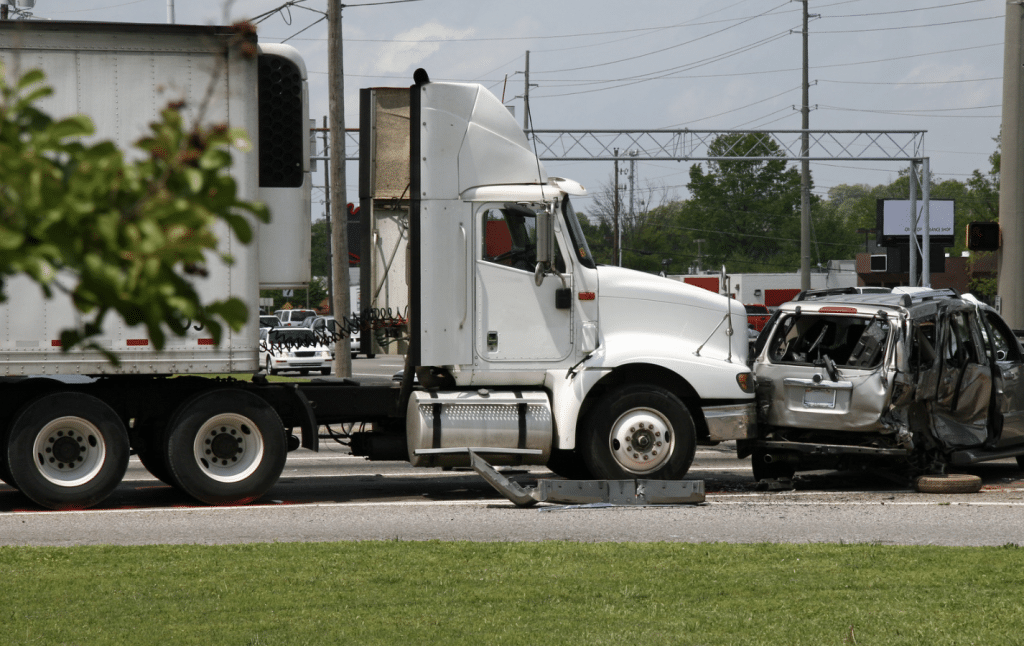Being rear-ended by a semi-truck while stopped is not only frightening but often leads to severe injuries and extensive property damage. Semi-trucks require significantly more time and distance to stop than regular vehicles, making proper braking crucial to avoiding accidents. When these massive vehicles fail to stop in time, the consequences can be devastating for those involved. Understanding how semi-truck braking systems work and the responsibilities of their drivers is key to addressing liability and ensuring justice for victims.
Truck drivers must maintain constant awareness of their surroundings and follow strict safety protocols to prevent accidents. This includes accounting for factors like weight, road conditions, and following distances. When a driver neglects these responsibilities, their failure to stop safely puts others on the road at serious risk. Victims of these accidents deserve to know their rights and hold the responsible parties accountable for the harm caused.
The Science Behind Semi-Truck Braking
Semi-trucks use advanced braking systems, such as air brakes, to stop their massive weight effectively. However, even with these systems, stopping a fully loaded truck can take up to 20-40 percent more distance than a passenger car under normal conditions. Factors such as weather, road surface, and truck maintenance further impact braking performance. A poorly maintained braking system or improper use of brakes can lead to disastrous consequences.
Drivers are trained to anticipate these challenges and adjust their driving habits accordingly. When they fail to do so, rear-end collisions often occur, especially when traffic slows or stops suddenly. Understanding the mechanics of braking and the challenges unique to semi-trucks highlights the importance of driver accountability. Victims of these accidents should work with legal professionals to assess whether negligence played a role in the crash.
Why Following Distance Matters
Maintaining a safe following distance is one of the most critical responsibilities of a semi-truck driver. Due to the truck’s size and weight, insufficient space between vehicles leaves little room to react in case of an emergency. Tailgating or failing to account for traffic conditions greatly increases the likelihood of a rear-end collision.
When semi-truck drivers disregard this basic safety rule, they put everyone on the road at risk. Victims involved in these collisions often suffer severe injuries and long-term consequences. Pursuing Broomfield truck accident claims ensures drivers and trucking companies are held responsible for unsafe practices. These claims also encourage stricter adherence to safety protocols, reducing risks for other motorists.
Safe Trucking Starts with Proper Maintenance
Regular truck maintenance is essential for ensuring brakes and other safety systems function properly. Worn brake pads, low air pressure, or faulty components can significantly reduce a truck’s ability to stop safely. When companies or drivers neglect routine inspections, they jeopardize the safety of everyone on the road.
Victims of rear-end collisions involving poorly maintained trucks often face complex legal cases. Determining liability may involve examining maintenance logs, repair records, and inspection reports. Holding trucking companies accountable for negligence in maintenance helps ensure better compliance with safety standards and prevents similar accidents in the future.
Understanding the Driver’s Responsibility
Truck drivers have a legal and moral obligation to operate their vehicles safely. This includes adjusting their speed, maintaining proper following distances, and ensuring their truck is in good working condition. Neglecting these duties can result in catastrophic accidents, particularly in high-traffic or stop-and-go situations.
In rear-end collisions, the driver’s failure to account for traffic patterns or braking needs is often a clear indication of negligence. Victims should document the circumstances of the accident and gather evidence to demonstrate driver fault. Legal support can be instrumental in holding negligent drivers accountable and securing compensation for damages.
Identifying the Role of the Trucking Company
Trucking companies are also responsible for ensuring their vehicles and drivers comply with safety regulations. This includes providing adequate training, enforcing hours-of-service rules, and maintaining their fleet. When companies prioritize speed and profit over safety, they create conditions that lead to preventable accidents.
Victims of rear-end collisions caused by semi-trucks should investigate whether the trucking company contributed to the incident through unsafe practices. Legal claims may include both the driver and the company, ensuring accountability at all levels. Addressing systemic issues in the trucking industry helps improve safety for everyone on the road.
Building a Strong Legal Case After a Collision
Pursuing a legal claim after a semi-truck rear-end collision requires thorough documentation and expert support. Victims should collect evidence, such as photos of the accident scene, witness statements, and police reports. Medical records detailing injuries sustained in the collision are also crucial for demonstrating the impact of the accident.
Working with an experienced attorney can make navigating the complexities of a truck accident claim much easier. They can help identify all responsible parties, negotiate with insurance companies, and build a case that maximizes compensation. This support allows victims to focus on recovery while ensuring their legal rights are protected.
Advocating for Safer Practices in the Trucking Industry
Rear-end collisions involving semi-trucks highlight the need for stricter enforcement of safety practices within the trucking industry. Holding drivers and companies accountable for negligence sends a clear message about the importance of adhering to regulations. Improved training, better maintenance, and the adoption of advanced safety technologies can all help reduce these types of accidents.
Victims who take legal action not only secure compensation for their losses but also contribute to broader changes that protect others. Advocating for safer roads benefits everyone and creates a culture of responsibility within the trucking industry. With increased awareness and accountability, these devastating accidents can become less common.
